
At a recent media gathering hosted by Kempinski,?President and CEO Reto Wittwer announced that last year was the best ever for the brand, and this year was projected to be even better.?While numbers were not revealed,?a recent Bloomberg article?reported that Kempinski?s profit climbed 18 percent in 2012.
Kempinski saw several notable openings in the first half of this year, with the debut of the?brand’s largest property in New Dehli?and?a new hotel in Shanghai. Perhaps the most notable opening was that of the?Palais Hansen?in Vienna, which?had been closed to the public since the 1870s.
Several key openings are planned in the coming months and years: In addition to its?soon-to-debut hotel in Riyadh, Saudi Arabia, Kempinski is looking to expand in Africa, with an upcoming hotel in Nairobi to complement?the new property in the Masai Mara?and another planned for Ghana. ?Africa is a rising star, and we want to be there,? he said.
Kenya website?CapitalFM?reports that the Nairobi hotel will have two Presidential Suites and one Super Presidential Suite, a separate food and beverage building with four restaurants and pillar-less grand ballrooms courtesy of DWP Architecture and Interior Design Firm.
(Bloomberg also reported that Kempinski is in talks to manage or buy properties in Barcelona, Paris and Nice, France, but David Sparrow, Vice President of Sales, said that opportunities in cities like Paris and Rome are ?very infrequent.?)
Wittwer said that the brand relies on three key components: Innovation and reinvention; acquiring and developing talent (managers should find and nurture talented team members themselves rather than leaving the task to the HR department); and constantly improving food and beverage options.
But in spite of these steps and the general sense of optimism, Wittwer does not expect the brand to expand much further. ?Luxury is numerically limited,? he declared, adding that the company would never have more hotels than its own age. ?The luxury agenda is written in uniqueness,? he added. ?A luxury hotel is collectively owned by its people who reflect the local community.?
Click here to read more.

